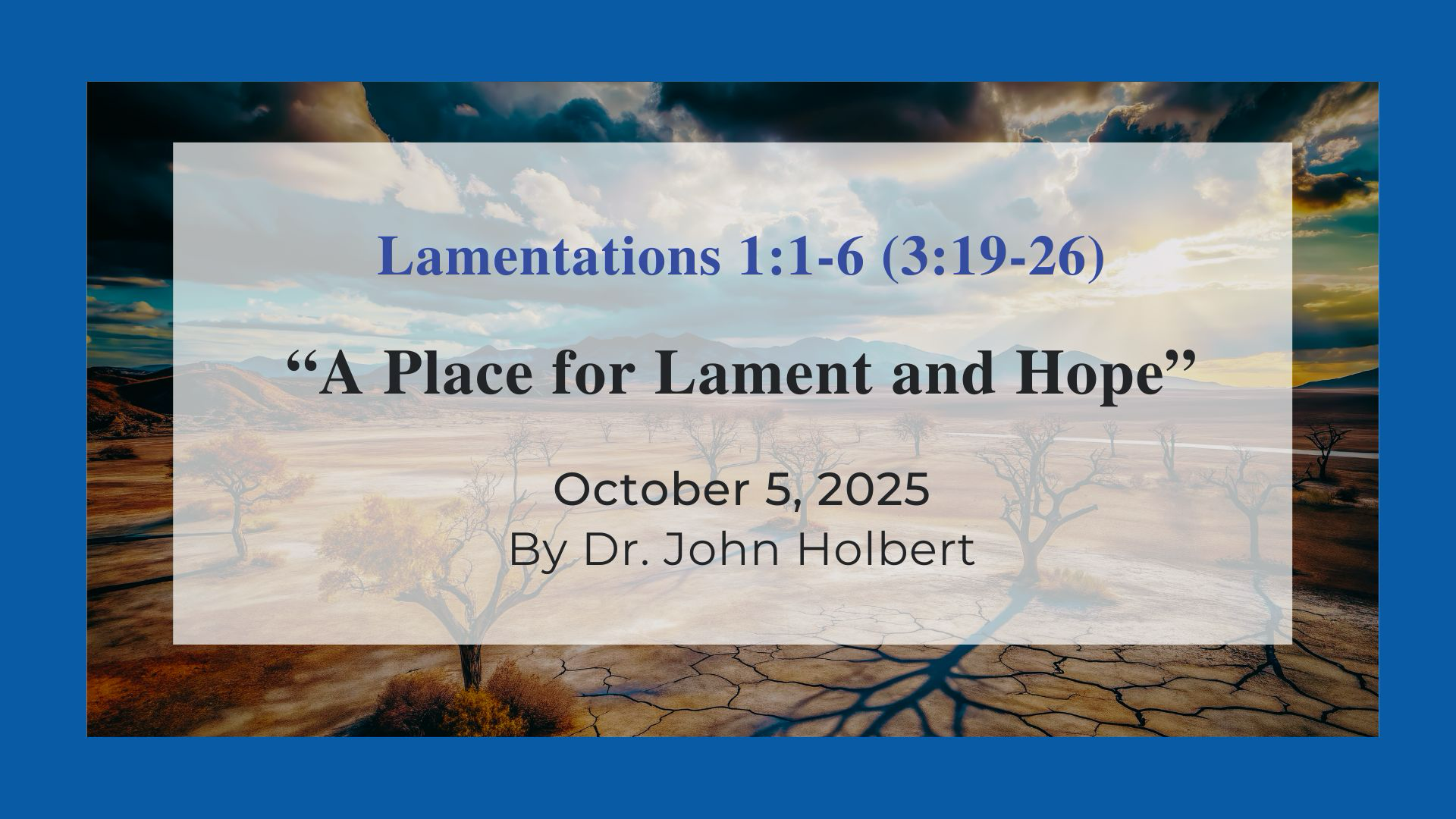A Place for Lament and Hope - Reflections from Lamentations 1:1-6 (3:19-26)
by John C. Holbert on Sunday, June 15, 2025

Tradition has long held that the brief book of Lamentations, placed canonically in our Bibles directly after Jeremiah, was in fact written by that prophet. This is hardly surprising, since the bitter laments of the prophet, so prominent among his oracles, are matched in the book of Lamentations. However, because Jeremiah was carted off to Egypt directly after the fall of Jerusalem in 587/586 BCE (see Jer.43), it is not likely that he composed these five poems of lament; rather they were perhaps written by some persons who remained in the city to witness its destruction and wrote in anguish of what they saw.
Lam.1 is itself an acrostic poem; that is, each stanza begins with a succeeding letter of the Hebrew alphabet. Such an artful arrangement serves at least two purposes: it makes for easy memorization, being used as a tool for scribal education; and thematically it suggests that the destruction hymned in the poem was in fact complete, just as the 22 letters of the Hebrew alphabet are a sign of completeness. “How (the word begins with Hebrew aleph) alone it lives, that city once full of people! She has become a very widow, formerly great among nations, a princess among the towns has become a servant” (Lam.1:1). The poet begins his dirge with a sad commentary on the once proud city of Jerusalem, formerly a bustling metropolis, filled with people and laughter and pleasure, now stands alone, like a widow, bereft of companions; once a princess among the towns of the land has now become little more than a servant or slave. (It must be said that the words I have translated “city” and “servant” are not altogether clear in meaning, but the implication seems correct.)
“She cries unceasingly by night, tears upon her cheeks;
no one comforts her among her lovers;
all her (so-called?) friends have acted deceitfully with her,
and have become her enemies” (Lam.1:2)
The poet now turns to the sorrowful reality of a defeated and destroyed city. He former friends and “lovers” have turned away, not only rejecting her as worthless, but have even actively become antagonists. Proud Jerusalem has been reduced to a discarded and lonely place, friendless and ever in danger of further attack from those former friends. The use of the word “lover” could suggest the foreign idols that were so popular during the prophecy of Jeremiah, who railed again and again against those who sought out those idols instead of seeking YHWH. The idols provided no real comfort then, and certainly offer nothing like comfort now in the ruins of the city.
“Judah has gone into exile with anguish,
with hard service;
She now lives among the nations,
and finds no place of rest;
All her pursuers have bound her
with constraints.” (Lam.1:3)
The poet pictures the now exiled Judah serving their Babylonian captors, attempting to find a new place among the foreign lands, but finding no rest, bound in captivity. This portrait may or may not have historical validity, because the Babylonian exile is rarely described as a harsh slavery, but the poet finds a dark imaginative way to paint the picture of a bound, exhausted, anguished people, far from their homeland.
“Her foes have become the controllers,
her enemies prosper,
Because YHWH has brought suffering,
due to the vast number of her transgressions.
Her children have gone,
captive before the foe.” (Lam.1:5)
The writer now suggests, however vaguely, that all of this horror is the result of YHWH’s fury against the “vast number” of Judah’s transgressions. The authors of the five poems of Lamentations offer a kind of summary of the various reasons for suffering provided in the Hebrew Bible: was the fall the result of YHWH’s fury against the city’s constant sinning? If that is so, then does God only extend retribution for sin or on occasion offer mercy? Can God be at the same time the bringer of destruction as well as the source of redemption? Is suffering ever required; is there finally a time when YHWH’s patience has ended?
The author of Lam.3:21-23 offers to us a bright note of hope in the midst of these very dark metaphors about the ruined Jerusalem.
“This I perceive in my heart;
therefore I have hope:
YHWH’s unbreakable love is never cut off,
because God’s compassion is never used up.
They (that is, both God’s “compassion” and God’s “love”)
are new every morning;
great is your faithfulness!” (Lam.3:21-23)
Of course, I imagine that wonderful hymn is now surging through your mind as you read those words. In spite of the terrors of the fall of Jerusalem, despite the exile of Judah, leaving behind a smoking and ruined city, yet the poet can still hymn the wonder of YHWH’s “love” (that near-untranslatable word chesed) and YHWH’s “compassion” (the Hebrew word for “womb”, rechem). And like these ancient artists so must we be always ready to sound the grand words of God’s unbreakable love and ever-constant compassion, even as we witness the horrors of our own time. Lamentations has much to teach in the way of keeping our eyes on the fuller riches of God.
